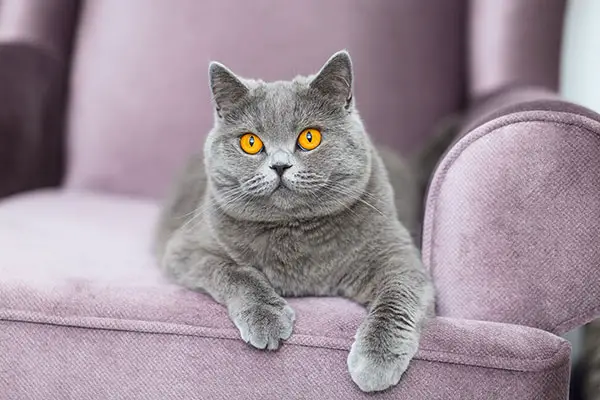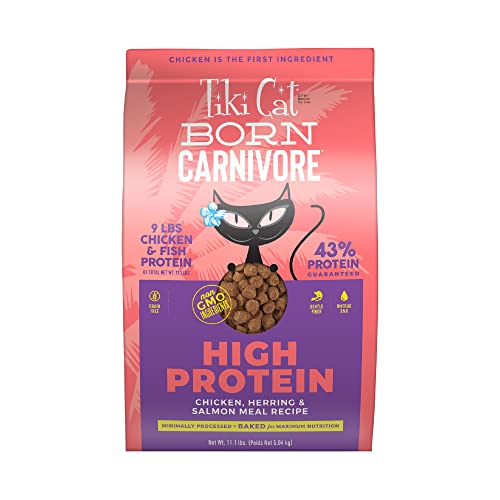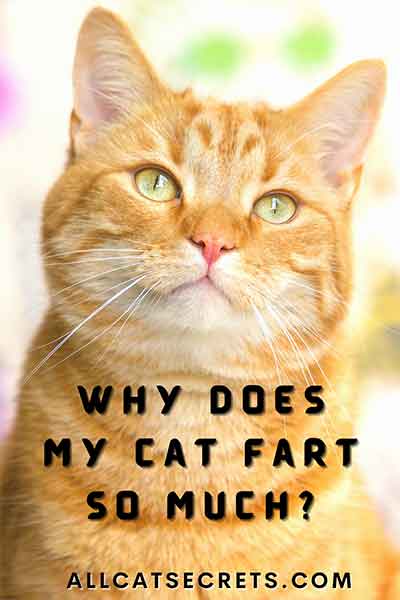Have you ever wondered if cats fart?
Well, like most animals, cats do fart and they probably do it more often than you’ll ever notice. Unlike human farts, most cat farts are whisper-silent and nearly odorless. So, unless you’re extra keen, you’ll never realize that your feline friend has passed gas.
However, cat farts can also be a stinky nuisance, especially if there are serious underlying medical conditions behind the farts.
But when are cat farts considered normal and when are they indicative of a serious medical condition?
Ideally, a cat fart should worry you when it happens unusually frequently and stinks abnormally awful. Now, that may get you wondering, why does my cat fart so much?
Ordinarily, your feline friend will pass gas due to an irritation in her digestive system. The irritation could result from a wide range of causes, including certain foods (particularly foods that are exotic to the cat), a sudden change in the cat’s diet, or certain medications. In the worst-case scenario, a cat may fart as one of the side effects of an underlying disease.
As a loving and caring pet parent, the onus is on you to investigate and establish the primary cause behind your cat farting incessantly. That’s the only way you’ll be able to adopt the right remedy.
This post shall attempt to explain some of the reasons why cats fart so much and what you can do to remedy the situation.
Table of Contents
Why Is My Cat Farting So Much
The concerns of a cat farting a lot are not uncommon among cat owners around the world. For such cat parents, there’s always the nagging question – why does my cat fart all the time?
As we already indicated, there are numerous reasons why your cat could be farting a little more than is considered normal for her.
The following are some of the possible reasons why your feline friend farts a lot;
1. Inappropriate Foods
Inappropriate food is unarguably the most common cause of cat farts. But to understand what foods are considered inappropriate for cats, we should begin easy by examining the foods that should make up a cat’s primary diet.
Now, cats are inherently obligate carnivores, which means that they can thrive on a diet of animal protein. Of course, it’s prudent to acknowledge that the domesticated cat has since acquired some of her human parent’s dietary habits.
Even so, a cat’s digestive system is naturally designed to process anything that’s closely related animal protein. Therefore, any food that a cat consumes other than meat will most likely cause her some digestive irritation, which usually manifests in farts.
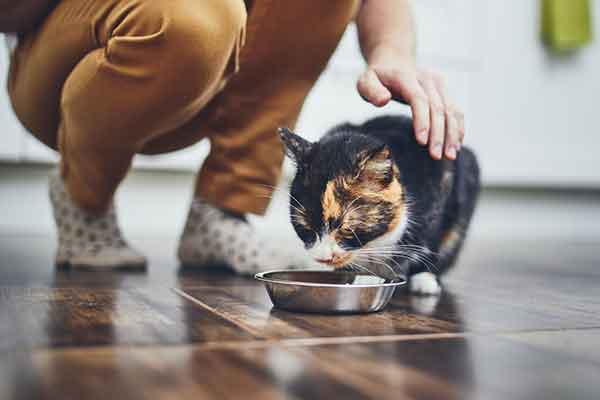
Some of the foods that will almost always cause feline flatulence include high-fiber foods and dairy products.
While a small amount of fiber can help to relieve bowel incontinence, fiber-rich foods are some of the greatest contributors to feline flatulence. Worse yet, too much fiber can have a laxative effect on cats, leading to diarrhea and dehydration.
On the other hand, dairy products are discouraged as they tend to contain lactose, which most cats are intolerant to. Although cats are born with lactase (the enzyme that digests lactose), the ability of their bodies to secrete this enzyme decreases as they grow up. That explains why kittens can safely consume dairy products but the same cannot be said about older cats.
Foods that are difficult to digest, such as whole grains and legumes, are also discouraged.
Another category of inappropriate foods that could also result in farts includes unhealthy human foods, such as the scraps that fall off the dinner table. It’s convenient to dismiss these scraps as unlikely to harm your feline friend. But depending on their primary ingredients, these human foods could be disastrous for your cat.
Remember that cats shouldn’t eat foods that are high in salt, sugar, fat, or spices like onions and garlic, regardless of whether the food is animal protein or not.
- Better Health for your Best Friend: Whether your cat has always struggled with digestion issues, or just needs a little extra help...
- Ultra-Concentrated Cat Probiotics: Our cat probiotics for diarrhea and vomiting is a custom treatment formulated with twenty...
- None of the Bad Cat Stuff: Don't fall for foreign-manufactured cat probiotics and digestive enzymes that use sugar, grain...
Last update on 2024-07-16 / Affiliate links / Images from Amazon Product Advertising API
2. Poor Eating Habits
Flatulence is one of the immediate consequences of eating too much or too fast. The same applies to cats too. So, feline flatulence can simply result from gulping down too much food or eating too fast.
This is usually a common phenomenon when a cat is scared of other cats or pets within the house. As such, she tries to down her food too quickly before other pets can snatch it from her.
Besides competition from other pets, your cat could also eat too fast or too much in anticipation of exciting activity. For instance, if you feed your feline friend just before exercise time, the cat will naturally consume her food hurriedly.
When a cat eats too much, it becomes difficult for all the food to be digested in her stomach. Indigestion causes the buildup of sulfur gas, which cases stinking farts.
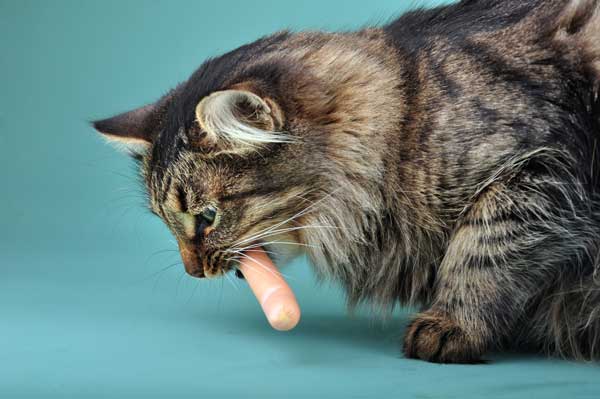
So, maybe you’ve always wondered, why are my cat’s farts so stinky?
Well, if you’re one of the many cat owners who keep asking themselves, ‘why does my cat’s farts stink so bad,’ one of the reasons is the cat eating too much. The excess food intake results in the formation of sulfur gas, which produces the often-unbearably stinking smell.
In some cases, the problem is not with the food itself. When a cat eats too fast or too much, she consequently swallows too much air. Since the air isn’t digested, it passes through the cat’s digestive system as is, and comes out the other end as fart.
It’s also important to note that certain breeds are more prone to swallowing air compared to others. Such breeds are known as brachycephalic breeds and some of the members include Himalayan and Persian cats.
Another aspect of poor eating habits is consuming spoiled foods. It’s logical to imagine that your cat will not scavenge your trash cans for food simply because you feed her well. However, remember that cats are inherently curious. As they check out their surroundings, they may stumble upon spoiled food in your rubbish bins or even kitchen shelves and consume it.
- One (1) 14 lb. Bag - Purina Pro Plan High Protein Cat Food With Probiotics for Cats, Shredded Blend Chicken and Rice Formula
- High protein formula, with real chicken as the first ingredient. Fortified with guaranteed live probiotics to support digestive...
- Crunchy kibble and meaty, shredded pieces for a delicious mealtime experience. Used to be known as SAVOR Shredded Blend Chicken...
Last update on 2024-07-16 / Affiliate links / Images from Amazon Product Advertising API
3. Sudden Diet Changes
Cats are creatures of habit and a slight disruption in their routine is likely to put them on edge. In the case of a sudden diet change, you can also expect the cat to fart in addition to other symptoms.
It’s worse if the new food is the kind that the cat considers exotic. For example, a cat that’s used to eating beef and chicken may develop flatulence if she is suddenly introduced to game meat like venison.
4. Food Allergies
Food allergies aren’t uncommon in cats. The surest way to tell that your cat is allergic to specific foods is if she develops serious gastrointestinal complications after consuming the foods.
Some of the tell-tale signs of feline food allergies include vomiting, diarrhea, loss of appetite, abdominal pains, and of course farting.
5. Intestinal Parasites
Your cat can pick intestinal parasites anywhere, including in the kennels, at the park, or in your lawn. Most of these parasites, such as hookworms and roundworms, enter your cat’s system when the cat is exposed to fecal matter from infected animals.
For instance, the cat may have accidentally stepped on the fecal matter and ingests the parasites during her routine grooming.
Intestinal parasites can cause full-blown digestive problems for your feline friend, including increasing her risks to colon disorders, stomach problems, and small intestine issues. Either of these complications can lead to a buildup of flatulence, causing your cat to fart.
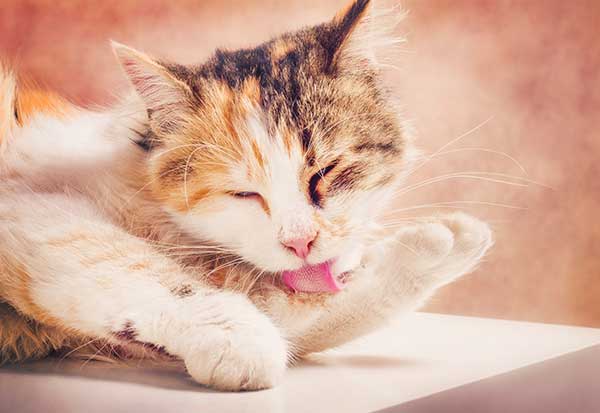
6. Hairballs
Hairballs refer to the strands of hair that your cat swallows while grooming herself. As the hairs are indigestible, they travel throughout the cat’s digestive tract and are expelled along with the feces.
Usually, hairballs present no significant health risks to cats. However, they can be a bit problematic for older cats or cats that over-groom themselves.
So, maybe you have an older cat and have been wondering lately, why does my old cat fart so much?
One of the reasons your older furry friend could be passing gas a lot is because she swallows too many hairballs.
- HIGH PROTEIN - 47 percent protein guaranteed, nutrition that mimics cats natural prey diets because cats need meat, not plants
- BAKED DRY CAT FOOD - Baked to preserve nutrients and enhance flavor. Made without animal by-products, corn, wheat, and soy
- NON-GMO INGREDIENTS - Your feline friend will thrive with the high-protein, high-fat and meat-based ingredients in Tiki Cat Born...
Last update on 2024-07-15 / Affiliate links / Images from Amazon Product Advertising API
7. Certain Medical Conditions
Other cat farts could be due to certain medical conditions. An example is feline malabsorption, which is an illness that originates in a cat’s digestive tract. Malabsorption often results from the cat’s inability to break down food properly.
If feline malabsorption goes untreated, it can lead to inflammatory bowel disease.
Another disease that causes farting in cats is anal gland disease, a condition that causes cats’ anal glands to become inflamed, infected, and filled with abscess and gas.
Various other diseases, particularly those that affect your cat’s digestive system, could also result in farts.
Some of them include;
- Pancreatic issues,
- Intestinal virus,
- Intestinal obstruction,
- Gastrointestinal cancer, and
- Inflammatory bowel syndrome (IBS)
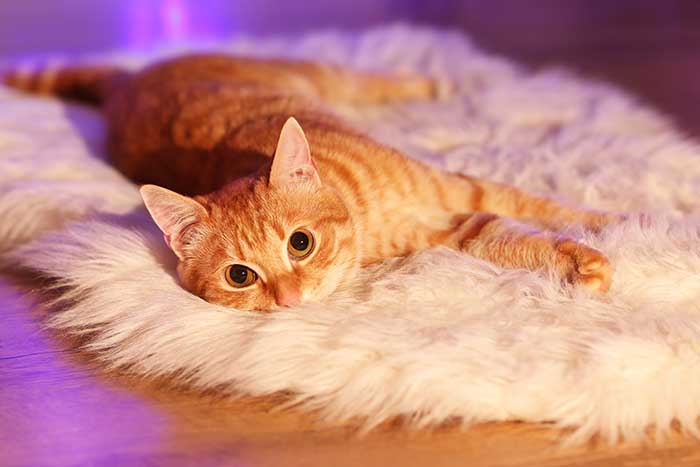
Is It Normal For Cats To Fart A Lot?
In general, cat farts shouldn’t be a major cause for concern. The farts simply result from the buildup of gas in the cat’s stomach.
However, it’s certainly abnormal for cats to fart a lot. The situation should worry you even more if the fart stinks to high heavens.
Ordinarily, you’d be worried about your cat’s as well as your own welfare. If the fart is due to an underlying medical condition, you have all the reasons to believe that the cat is suffering. And when a cat farts a lot, there are high chances that her farts will stink too, making the situation a bit unbearable in your house.
But what causes cat farts to stink?
As we already alluded earlier on, cat farts are made up of the foul-smelling sulfur gas. The gas is one of the immediate effects of indigestion.
Besides sulfur gas, cat farts may also contain various other odorous sulfur-based compounds, including;
- Hydrogen sulfide,
- Methyl mercaptan,
- Dimethyl sulfide,
- Dimethyl disulfide, and
- Dimethyl trisulfide
There may also be a bit of ammonia, which only exacerbates the smell. For cats with diseases like giardia or irritable bowel disorders, every fart is a serious affair.
- L-LYSINE FOR CATS SUPPLEMENT POWDER - 900 mg of l-lysine hydrochloride per scoop, natural chicken liver flavor for picky eaters....
- CAT IMMUNE SUPPORT SUPPLEMENT - Our best l-lysine cats supplement powder works as a pet immune system booster without the use of...
- CAT RESPIRATORY SUPPORT - Our powerful cat vitamins and supplements contain 2x more cat lysine supplement amino acids per scoop...
Last update on 2024-07-15 / Affiliate links / Images from Amazon Product Advertising API
While plain farts may not be immediately indicative of an underlying disease, the following additional symptoms should necessitate an immediate trip to the vet;
- A sudden increase in flatulence levels,
- Loss or reduced appetite,
- Vomiting and diarrhea,
- Abdominal pain, which is usually noticeable as biting or scratching whenever you try to touch the cat’s abdomen,
- Blood in the stool,
- Mucus in the stool,
- Drooling,
- Excessive sleepiness or the inability to sleep,
- Bladder and/or bowel incontinence, which manifests in straining when using the litter box,
- Scooting of her anus on the floor, and
- Rumbling stomach.
But even if your cat isn’t suffering from a serious medical condition, the mere fact that she produces a stinking gas is unsettling enough. Worse yet if the cat farts too much.
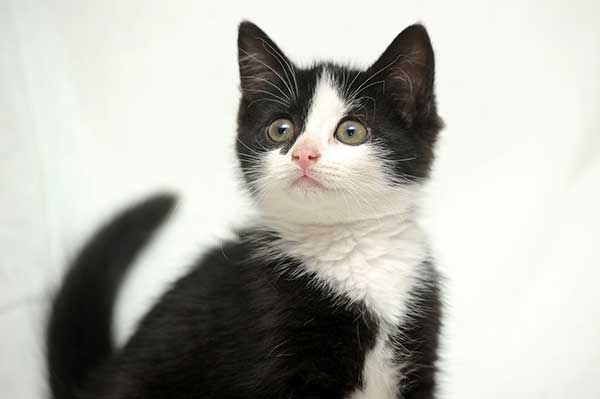
What Should I Do When My Cat Farts Too Much?
As soon as you realize that your cat farts a lot, the first thing to do is try and establish the underlying cause behind the problem. That’s because the solution you adopt depends on the cause.
The following are some of the ways to prevent your cat from farting too much;
1. Feed your cat properly
A diet-based approach for preventing farting in cats should take into consideration aspects of quality, quantity, and timing.
Carefully monitor the food portions that your cat consumes and ensure those foods are generally cat-safe. Avoid feeding your feline friend too much salty, fatty, or spicy foods.
Also, try to limit the animal’s intake of carbohydrates and instead, insist on animal protein. If you’re ever in doubt, opt for high-protein, grain-free, dry cat food.
And while you’re at it, ensure that you properly time your cat’s feeding hours. Avoid feeding the animal when she is overly anxious as she may eat too quickly and swallow gas in the process.
If your cat just can’t help eating too quickly, consider feeding her small food portions at various times during the day. That will allow her ample time to digest her food properly.
2. Exercise your cat regularly
This should be a no-brainer. A cat that doesn’t receive adequate exercise is at risk of developing various lifestyle-related diseases like obesity, diabetes, and heart disease.
Inadequate exercise also has negative effects on a cat’s metabolic rate, and low metabolic rate is one of the leading causes of indigestion.
If your schedule is rather tight that you can’t seem to spare enough time to exercise your cat, you can consider buying her interactive toys.
3. Eliminate parasites
You can reduce your cat’s risks of contracting parasitic worms that cause flatulence by eliminating these parasites.
One of the surest ways to combat these parasites is to improve the sanitation standards in your home. Keep all litter boxes clean. Also, chuck all food leftovers into the trash and seal all trash cans tightly.
If you suspect that your home is infested with parasitic worms, consult your vet for advice on the right medication.
Other tips you can implement to prevent your cat from farting too much include;
- Avoid giving your cat human foods
- Go slow on diet changes
- Groom her often
- Always follow a cat’s nutrition checklist before introducing any new food to her
- Enlist the help of a professional veterinary officer
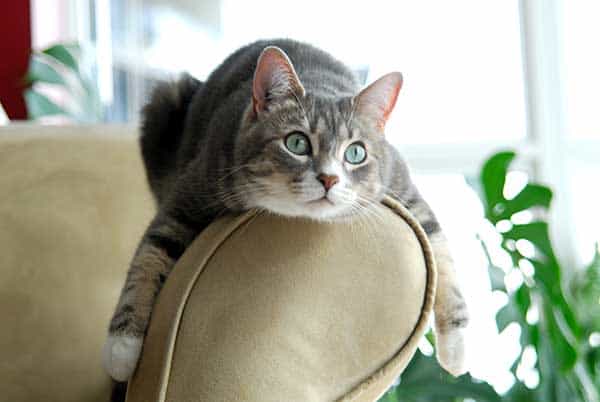
Other Frequently Asked Questions on Why Cats Fart A Lot
Does wet cat food cause gas?
Some cats may develop gas on wet cat foods, whereas others will become flatulent after consuming dry cat foods. It all depends on the ingredients in the food. For instance, legumes and cruciferous vegetables will cause gassiness, regardless of whether the food is wet or dry.
Why does my male cat fart so much?
Cat farts know no gender, and male cats fart just as much as females do. So, the reasons why your male cat farts so much are nearly similar to the general causes of cat farts that we highlighted earlier.
Why does my kitten fart?
Again, kittens will fart for the same reasons that cats fart in general. The only difference is that kittens tend to fart more intensely as their stomachs are highly sensitive, hence more likely to reject unfamiliar foods.
- Precise balance and highly digestible ingredients for sensitive stomachs and for cats with sensitive skin
- Prebiotic fiber to fuel beneficial gut bacteria and support a balanced microbiome
- Omega-6s & Vitamin E to promote a healthy coat
Last update on 2024-07-15 / Affiliate links / Images from Amazon Product Advertising API
Do cats fart when they are scared?
Yes, some cats may fart when they’re scared.
Why does my cat fart so loud?
This could mean that the cat is so very scared. Loud farts might also indicate that the animal has way too much gas in his stomach.
Why does my cat fart when I pick him up?
If your cat farts a lot when you pick him up, this could be the surest indication that there’s a problem with the animal’s digestive system.
Conclusion
Cats fart for various reasons and in most cases, there’s usually no cause for alarm. However, you should consult a vet immediately if your cat passes way too stinky gas. And more so if the farts are accompanied by other gastrointestinal symptoms like vomiting and diarrhea.
Checkout Our Favorite Cat Products
1. Best Online Course For Cat Parents
Our favorite: The Cat Language Bible (How to Finally Understand And Speak to Your Cat) – A new form of cat to human communication that many cat owners have dreamed about… but few have actually thought possible.
2. Best Immune Support For Cats
Our favorite: Tomlyn Immune Support – Best Supplement for Cats and Kittens.
3. Best Cat Treats
Our favorites: LIFE ESSENTIALS All Natural Freeze Dried Chicken And Sheba Meaty Tender Sticks – Both are Great.

